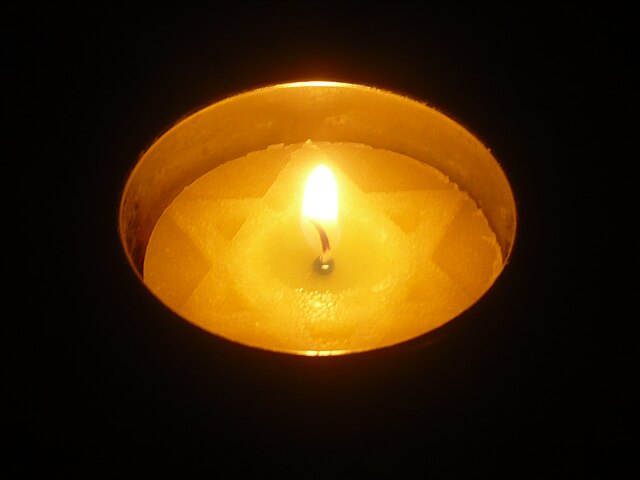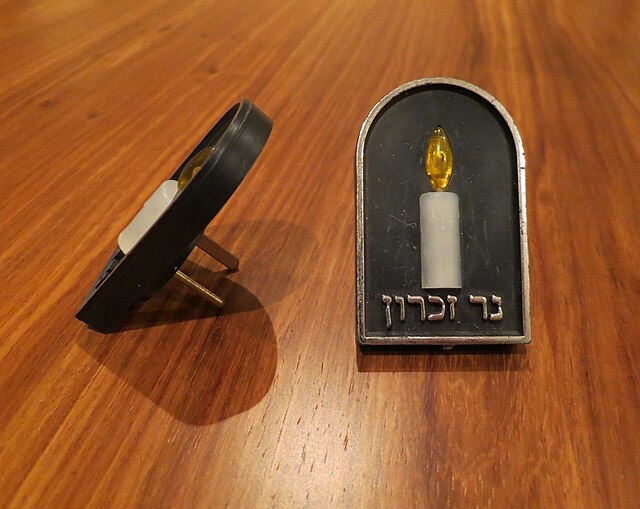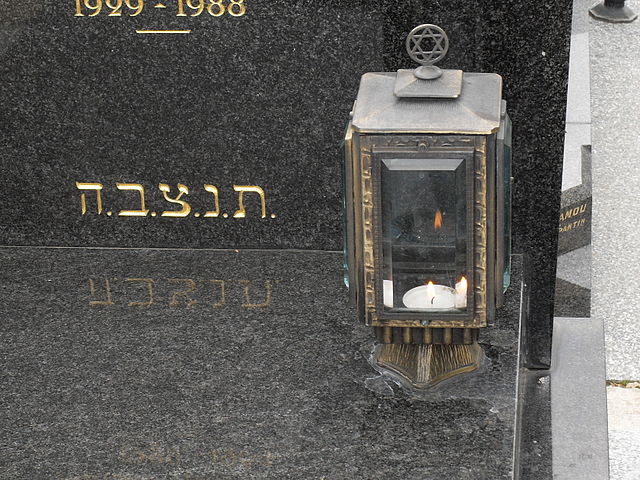Yahrzeit candle
Candle lit in memory of the dead in Judaism From Wikipedia, the free encyclopedia
A yahrzeit candle, also spelled yahrtzeit candle or called a memorial candle, (Hebrew: נר נשמה, ner neshama, meaning "soul candle"; Yiddish: יאָרצײַט ליכט yortsayt likht, meaning "anniversary candle") is a type of candle that is lit in memory of the dead in Judaism.[1]






Wikimedia Commons has media related to Category:Jewish grave candles.
Name
The word "yahrzeit" (Yiddish: יאָרצײַט yortsayt ) itself means "anniversary" (or more specifically "anniversary [of a person's death]") in Yiddish, originating from German Jahr, year, and Zeit, time.
In Hebrew, the candles are also called Ner Neshama – a candle for the soul.[2]
Remembrance
Summarize
Perspective
The use of a yahrzeit candle is a widely practiced custom, where mourners light a yahrzeit candle that burns for 24 hours, on the anniversary of the death on the Hebrew calendar.[3] Many Jews who are otherwise unobservant follow this custom.[3] It is customary to light the candle inside one's home, or near the grave of the deceased.
The candle is also lit before Yom Kippur and there are also customs to light a yahrzeit candle on the dates when the yizkor prayer is said in synagogue (Yom Kippur, Shemini Atzeret, final day of Pesach, and Shavuot). Some also light before the Holocaust Remembrance Day ceremony (Yom HaShoah).
In all cases, the candle is lit before sundown. This is because in Judaism, days begin at sundown, in accordance with Genesis, e.g., 1:5: "And there was evening and there was morning, one day."[4])
It is also customary to light the candle during the shiva, usually a larger one that lasts the entire seven days. In the absence of a seven-day Shiva candle, seven yahrzeit candles can be lit on successive days (but not in violation of Shabbat).
Today, some people use an electric yahrzeit candle that plugs into the wall instead of a candle for safety reasons, such as in a hospital.[5]
Source
The custom of lighting a yahrzeit candle comes from the Book of Proverbs 20:27 "The soul of man is a candle of the Lord."[3]
A candle similarly appears in the midrashic description of Aaron's death:
[God] said to [Aaron]: "Enter the cave", and he entered. He saw a bed made and a candle burning. [God] said to him, "Go up on the bed", and he went up. "Spread out your hands", and he spread out his hands. "Close your mouth", and he closed his mouth. "Close your eyes", and he closed his eyes. Moses immediately desired that his death would occur the same way.[6]
Holidays
Yahrzeit candles are also commonly used on holidays, for reasons of convenience rather than symbolism.
On Passover, Shavuot, Sukkot, and Rosh Hashana, it is forbidden to light a new fire, but permitted to light one flame from an existing flame for certain purposes (like cooking). Therefore, a yahrzeit candle (or other long-lasting candle) is lit before the holiday, so that a flame is available in case of need. Similarly, havdalah after Yom Kippur requires a fire that has burned since before the holiday, and yahrzeit candles are often used for this purpose as well.
48 hour and 72 hour candles have also been manufactured, for holidays that last more than one day.
In culture
- After Israeli Prime Minister Yitzhak Rabin was assassinated in 1995, the young people who came to mourn Rabin at the Kings of Israel Square where he was killed were dubbed the "Youth of the Candles" (נוער הנרות, noar hanerot) after the many yahrzeit candles they lit.
- Yahrzeit candles are often lit by many Jewish communities on Yom HaShoah (Holocaust Remembrance Day) in remembrance of those who were murdered in the Holocaust.
Gallery
- The grave of David Ben-Gurion, the first Prime Minister of Israel, along with his wife. His tomb is covered in yahrzeit candles and stones.
- The standard Israeli military graves of David Elazar, Jonathan Netanyahu, and others with a yahrzeit candle in a box for each grave
- The assassination site of Israeli Prime Minister Yitzchak Rabin. It is usually filled with yahrzeit candles and flowers.
- Yahrzeit candles and signs entitled "You shall not murder" at a solidarity rally at Rabin Square for the victims of the 2009 Tel Aviv gay centre shooting
- Yahrzeitlicht from Lengnau in Aargau (Switzerland), 1830, now in the Jewish Museum of Switzerland
See also
References
External links
Wikiwand - on
Seamless Wikipedia browsing. On steroids.





